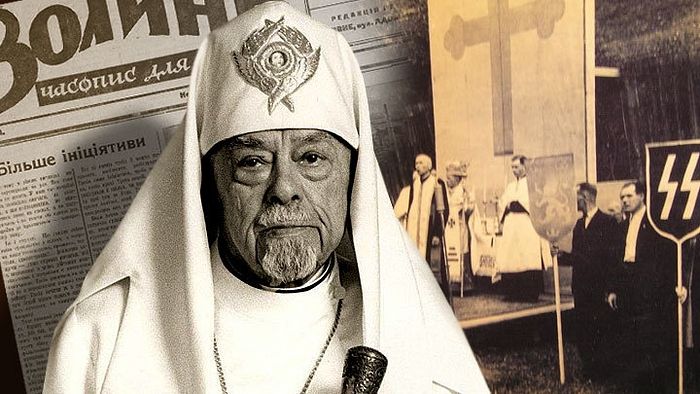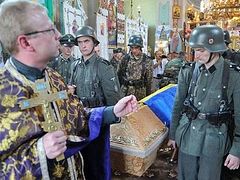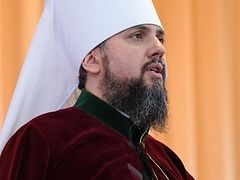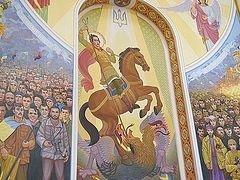OrthoChristian.com has been presenting articles intended to shed more light on the history of Orthodoxy in Ukraine, so that our readers might be able to make more sense of what is happening there today. We are proceeding from the assumption that history did not begin there in the 1990’s, and not even the 1940s.
The author of this article is commendably helping us pick apart a particularly complicated issue.
* * *
Not long ago I translated an article by Archpriest Rostislav Yarema, “An Overview of Church Schisms In Ukraine”. A comment was posted to that article accusing the author of “incredible” bias and lies:
This was an interesting read, but incredibly biased and not completely truthful. Metropolitan Polikarp Sikorski was consecrated to the episcopate by Metropolitan Dionizy (the first primate of the Autocephalous Polish Orthodox Church) in 1932. In 1942, Mstyslav received consecration from Polikarp (with the blessings of Dionizy)!! Mstyslav was a canonical bishop of the Polish Church. He was not "self-consecrated." It is an utter lie to say that.
I would like to begin by saying that I hold nothing personal against the commentator. That said, being acquainted with the author of this article, I must take issue, because not only is the honor of a friend being questioned, but more importantly of an Orthodox priest—and that by someone who I can only assume was neither born in Ukraine, nor is fluent in Polish, unlike the author, who is a professor of history decorated by the Metropolitan of Warsaw.
I am not writing this to attack the commentator in any way, but rather to defend the truth.
Because this is a very complex situation there is much to say, however here is the short version:
The commentator first of all, is misquoting the actual article. The article specifically says:
“Archbishop” Polikarp (Sikorskyi) former bishop of Lutsk; January 24, 1942, in German-occupied Ukraine, the Reichskommissariat registered a new generation of the UAOC. Characteristically: Served and assisted the occupying regime, “consecrated to the episcopacy” Mstyslav (Skrypnyk).
The article does NOT say verbatim that Mstyslav was “self-consecrated” per se. The commentator is the first person to actually use this word with reference to him.
The article says exactly that Polycarp “consecrated” Mstyslav; it is not saying Mstyslav consecrated himself, but the reason we are calling this consecration into question, and regard it as illegitimate, is because Mstyslav was consecrated illegally on the territory of the suffering Russian Church, in an entity supported by the Nazi occupiers during WW2.
Mstyslav , much like the current “OCU” schismatics, are essentially ecclesiastical occupiers on the territory of another Local Church—the Russian Orthodox Church. Mstyslav also supported Nazis himself, and we will present evidence of it in this response.
Now for the longer answer. The more we examine the situation, the more we see how wrong these events were. I will begin with a question. If a violent political revolution occurs, and murders the clergy and laity of a certain Local Church, does that mean another Local Church can step in, and appoint its own clergy there? Can they do this to their own benefit, not as placeholders, invited to help, but taking advantage of the situation to form a new jurisdiction?
Because that is what happened. In the first half of the twentieth century, the Russian Church was being persecuted by godless Bolsheviks, and the land was being invaded by foreign Nazis who approved of the UAOC. Just because the Ecumenical Patriarchate stepped in and claimed this suffering ecclesiastical territory, does not mean he or any other Local Church has the right to canonically install bishops there!
Who gave them this right? When Constantinople was occupied by the Ottomans, would another Patriarchate have had the right to install bishops in Thrace?
This territory was never renounced by the Russian Orthodox Church, nor was permission given by Patriarch Tikhon, when he was alive, for another Local Church to take over this territory, nor was any consideration made for Russian Church Abroad. This was in the Ukraine, not in Poland, and the Russian Church began there in Kiev.
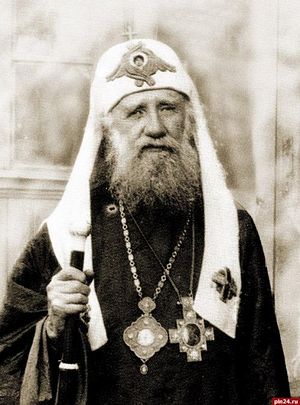 St. Patriarch Tikhon of Moscow In fact, while Saint Tikhon of Moscow was alive, and the Russian Church was undergoing her podvig of confession and martyrdom, Patriarch Meletius IV of Constantinople not only took this as an opportunity to invade the Russian Church’s territory and start granting autocephaly to various churches there, but he openly condemned Saint Tikhon!
St. Patriarch Tikhon of Moscow In fact, while Saint Tikhon of Moscow was alive, and the Russian Church was undergoing her podvig of confession and martyrdom, Patriarch Meletius IV of Constantinople not only took this as an opportunity to invade the Russian Church’s territory and start granting autocephaly to various churches there, but he openly condemned Saint Tikhon!
He said Saint Tikhon should step down as patriarch, and supported the Renovationist heretics who are now universally condemned as heretics, whereas Saint Tikhon is universally recognized as a saint. Still, during that time, Constantinople took the position that he was not fit to lead, and the renovationists were in fact a church. In the article, Zaporozhye the Unconquered, we actually read examples from the lives of priests in Ukraine who were persecuted by the godless Bolshevik-communists—who promoted the renovationist church. We see how these priests bravely declared they would die before they became a renovationist. See the article here.
Schismatics like Lipkovsky, the first founder of the original UAOC were genuine self-consecrators, they consecrated themselves and openly despised the canons of the Orthodox Church, saying they would create a new “Living Church”; essentially, although not directly belonging to the “Living Church”, they propagated the same idea as the renovationists. They even supported the Bolsheviks as “liberators” against the monarchists… Does anyone need to be reminded what the Bolsheviks did to the Tsar and his family? Moreover, who is actually among the choir of saints as we speak? Neither Lenin, nor Lipkovsky, nor the schismatics will be found there, but countless Ukrainian priests murdered by them, who in life spoke the beautiful Ukrainian language, will be found there together with the Tsar-Martyr and all the confessors of the Russian Church.
Mstyslav was illegitimately “consecrated” on the lands of another suffering Church without the permission of its hierarchy, who depending on one’s view, would have ultimately either been Metropolitan/Patriarch Sergius I, or Patriarch Alexy I.
If you wish to take the position that Moscow was occupied by godless soviets (as if being occupied by Nazis is any better [!]), then the territory of Ukraine could have been seen as belonging to the Russian Church Abroad. During this time period, it was under the care of Metropolitan Anastasy (Gribanovsky) of Kishinev and Khotin (in Bessarabia, Western Ukraine). Still, oppression has never prevented or stopped the Church from functioning over its 2000-year history—we are professional persecution survivors!
Metropolitan Anthony Khrapovitsky, the founding First Hierarch of ROCOR, never once renounced the title “of Kiev and Galicia” even as a refugee in Serbia, and thus remained the legitimate Metropolitan of Kiev. Transcarpathia in fact was passed under the care of the Patriarchate of Belgrade for a time, to shield the people from the actions of the Bolsheviks.
Instead, people like Lipkovsky, Polycarp and Mstyslav took advantage of the Nazi occupation and/or the Bolshevik persecution prior to that, to occupy canonical territory that was not their own. It was essentially a massive land grab.
Who gave them the rights to this land? Just because the Russian Church was being attacked daily, it does not mean its land can be auctioned off to the highest bidder, with lots cast for her holy sites while Holy Rus’ is still alive and still rendering services to God, persecuted as she may have been.
Imagine if the legitimate owner of the home is driven away by the godless, and another man occupies his home, and claims it as his own. Does that really make it his? Does this mean that if someone murderers the priest of a church, and occupies this land, another bishop of another Church can walk in, claim the parish and all the ancient sites as his own, and install priests and bishops there answering to him?
Even if churches there were built for example, by the order of the Russian Empress, like St. Andrew's Church in Kiev, were Mystslav was supposedly “consecrated”? Who gave him the right to a church, built by the Russian Empress, with money from the Russian crown, by Bartolomeo Rastrelli, an Italian architect? And this was all done under the authority of Nazi Germany! Ironically, this is the one church that Poroshenko's government already transferred to Bartholomew of Constantinople!
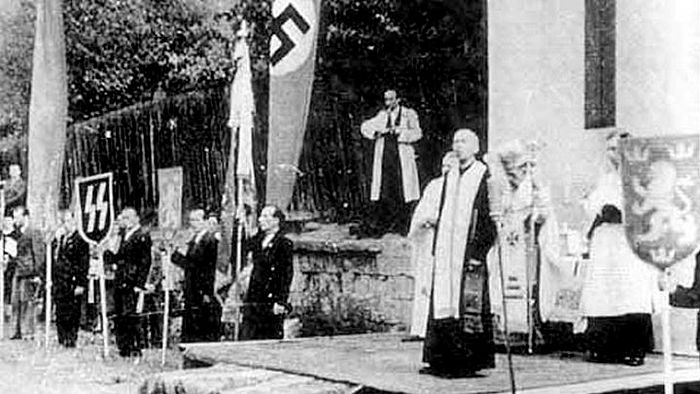 Photo: www.globallookpress. com
Photo: www.globallookpress. com
Polikarp, Mstyslav, and likeminded individuals supported Adolf Hitler and the Nazi German occupiers! Examples of this can be found in the book Nazi Empire-Building and the Holocaust in Ukraine by Wendy Lower. Here is what Mstyslav (Stepan Skrypnyk) himself wrote, in the newspaper Volyn’, on May 7, 1942, I include it both in the Ukrainian original, as well as in English:
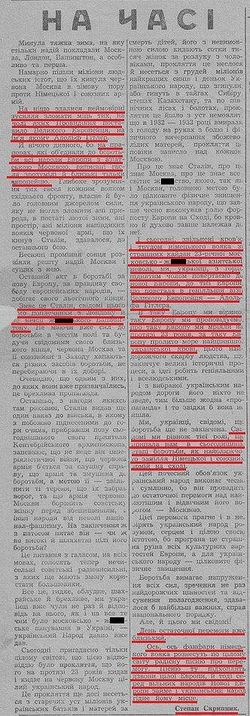 And today, released from the terrible chains of twenty-three years of Muscovite-Jewish-Asian slavery by the blood and labor of German soldiers, we Ukrainians proudly with raised heads return to a new Europe, to that very Europe which arose in the genius vision of the great European Adolf Hitler. It is in this Europe which we believe, in this Europe which we preach in our sermons, we dreamed of such a Europe for twenty-three years. For this Europe we shed a sea of precious Ukrainian blood.
And today, released from the terrible chains of twenty-three years of Muscovite-Jewish-Asian slavery by the blood and labor of German soldiers, we Ukrainians proudly with raised heads return to a new Europe, to that very Europe which arose in the genius vision of the great European Adolf Hitler. It is in this Europe which we believe, in this Europe which we preach in our sermons, we dreamed of such a Europe for twenty-three years. For this Europe we shed a sea of precious Ukrainian blood.
І сьогодні звільнені кров'ю і трудом німецького вояка зі страшних кайдан 23-річної московсько-єврейської азіятської неволі, ми, українці, з гордо піднятим чолом повертаємо до нової Європи, до тієї Європи, що повстала в геніяльній візії Великого Європейця – Адольфа Гітлера. В таку Європу ми віримо, таку Європу ми проповідуємо, про таку Європу ми мріяли на протязі 23 років, за таку Європу пролито море найціннішої, української крові
True, Mstyslav fell out of favor with the Germans, but if anything, that simply exposes him as a time-server who at one moment, is a citizen of the Russian Empire, at the next, a Ukrainian separatist, then a Nazi collaborator, then a dissident abroad, then “Patriarch of Kiev” in absentia. Arguing that he is legitimate because he was ordained by Polycarp under very confusing circumstances—a war during which accurate details are hard to ascertain—does not help. And who … as in… which Synod… gave Polycarp this blessing to ordain him? Can we guarantee he was ordained by at least two, ideally three bishops who themselves, were canonically ordained by two or three bishops?
Where is this information recorded? Do you have a copy you can present, as I presented Mstyslav’s news paper article? Archival records are all the more important in these convoluted times. We don’t recognize someone as canonical just because someone said they were, especially when his supporters are all surrounded by people of highly questionable canonicity who often pray with Uniates.
Still, note that in Fr. Rostislav’s article, Mstyslav is not being called a self-consecrator, but rather his consecration into a diocese in Ukraine is illegitimate because it was the usurped territory of another Church. Moreover, it is known that together with the Mstyslav movement, many actual self-consecrators of Lipkovsky’s movement later joined this revived UAOC. The self-consecrators did not magically disappear, but returned both here, and abroad in the USA and Canada into Mstyslav’s organization. If you serve with schismatics and heretics in the same body, you essentially become one yourself, because you are communing from the same chalice—hence you are literally in communion.
No one can be ordained to the episcopacy on territory which already belongs to another canonical bishop, and part of another Local Church. Even if Patriarch Bartholomew himself declared that he is now “Patriarch of Kiev”, we could call him an illegitimate “Patriarch”.
In that situation, we would NOT be saying he is not the Patriarch of Constantinople—that his previous ordination was invalid—but that he would be a self-declared and invalid “Patriarch of Kiev”. Not even a Patriarch can summarily claim the diocese of a bishop of another Local Church.
The issue with Mstyslav is essentially the same as the issue of Epiphany (Dumenko, of the OCU). As Philaret has said, if he is under anathema, then Epiphany isn't even a priest. Epiphany was ordained by Philaret at a time when the Patriarch of Constantinople recognized his anathema, together with universal Orthodoxy; even if he can lift the anathema, or receive a defrocked bishop into his own patriarchate, how can he recognize those ordained by someone when they were in schism, not only to the episcopate but even to the priesthood! Epiphany is the product of Philaret, much like the entire hierarchy of the UOC-A and UOC-C movements, was born in schism so to speak:
See this article by Bishop Job, which details the actions of those movements, and Mstyslav and people like him when abroad. We run into these shameful, confusing and convoluted canonical situations, where these “clergymen” are only barely legitimate by technicality (being received and ordained into the Ecumenical Patriarchate in North America), or were outright self-ordained schismatics. In one instance, another Polish bishop received control of these individuals, and knowing them to be self-consecrated, yet still desiring to be their Primate, had to secretly re-ordain the priests.
Even if in that case those priests were then considered legitimate, is this ideal? Is this a situation we want, where priests are barely even priests, and if so, by economia only? Where bishops are ordained under the shadow of Nazi occupation on the territory of a suffering Church, and ordination only made possible because that Church was persecuted and unable to protest?
Bishop Job, the author of that wonderful article is a Ukrainian speaker from Western Ukraine. A person’s ethnicity or language should not necessarily matter, but there is often an idea that those who agree with the Patriarchate of Moscow in this issue, are simply ukrainophobic "Muscovites"; yet half the hierarchy of the UOC including the Metropolitan of Donetsk are western Ukrainians. The current primate of ROCOR is a Ukrainian! Fr. Rostislav is also a western Ukrainian who is not only fluent, but a published author in the Polish language.
Nonetheless, people like Mstyslav and Epiphany are uncanonical because they are ordained either by people of a dubious lineage, or on essentially occupied territory.
Some argue the solution in the case of Epiphany, as well as of these schismatics, is that they simply need to be re-ordained. This is a dangerous line of thinking. Bear in mind, Orthodox people receive, in some cases, Catholic clergy simply by vesting, that is to say, without re-ordination. So, the issue is not simply who performs the ordination, or under which Church, but whether they have the right to perform it. They do not have the right to ordain on occupied territory.
It is also worth looking at the position of the modern Polish Orthodox Church, seeing as the argument is relating to Polycarp being a Polish bishop.
Now that we are removed in time from the ugly period of godless communism, and nationalistic Nazism in the early twentieth century, we can perhaps look at the situation more objectively.
The support from the wonderful and pious Polish Orthodox Church for the Ukrainian Orthodox Church, and His Beatitude Metropolitan Onufry of Kiev and All Ukraine (eis pola eti despota) is incredibly strong. Why would the Polish Orthodox Church so strongly support the Metropolitan of Kiev, who is part of a Church structure that the UAOC was fundamentally opposed to, if they in fact are the alleged source of canonicity for that UAOC, which they certainly didn't support in our times! Support for the UOC is held by the majority of Orthodoxy; it is not the majority who holds the burden of proof here.
There are very strong relations between the Polish Orthodox Church and the Russian Church (including traditions abroad) today, but let's go back to the roots. Bear in mind the southern part of the Polish Church was part of so-called Red Ruthenia (Chervona Rus') and also part of the Kievan Metropolia, at the time of Saint Petro Mohyla, Metropolitan of Kiev, Galicia, and all Russia, and Exarch of the Throne of Constantinople.
So ironically, by taking the Kievan Metropolia back into its stavropegion, the Ecumenical Patriarch technically would have had to have also taken the Lublin-Chełm diocese away from the Polish Orthodox Church, as it was historically part of the Kievan Metropolia of the Ecumenical Patriarchate (I'm not sure His Eminence, Archbishop Abel would appreciate having his diocese stolen!), as that was historically the Kievan Metropolia of Constantinople.
In fact, this is essentially the argument of Phanar supporters, as evidenced by Archbishop Job (Getcha), who says the Orthodox Church in Poland was proclaimed the successor to the Kievan Metropolia. He amazingly speaks of an “administration of the Orthodox Church on the liberated Ukrainian lands” [which] was created, headed by its administrator, Metropolitan Polycarp (Sikorsky)”, perhaps forgetting in this case, the so-called “liberators” would be the Nazis.
Nonetheless, the Polish Orthodox Church makes no such claim to the Throne of Kiev, nor does Kiev or Moscow make claims to the throne of Warsaw.
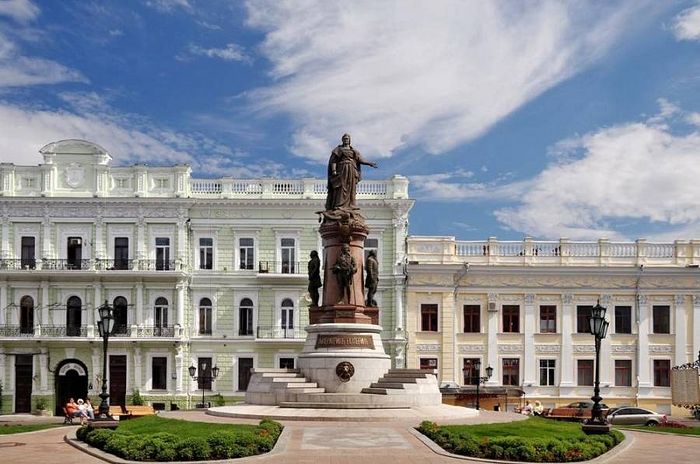 Odessa. Monument to Catherine the Great and her companions: José de Ribas, François Sainte de Wollant, Platon Zubov and Grigory Potemkin
Odessa. Monument to Catherine the Great and her companions: José de Ribas, François Sainte de Wollant, Platon Zubov and Grigory Potemkin
The Kievan Metropolia (prior to the reunion with Moscow) did include southern Poland, but did NOT include the Crimea, Odesa, Kherson, Mikolaïv, etc. as those cities were neither part of Russia nor the Polish Lithuanian Commonwealth at the time. Odessa and Kherson, for example, were established by the Russian Empire and the Russian Crown; so why then (even if the dubious claims of Constantinople to the Kievan Metropolia of today are recognized), would Constantinople's claims to, say, Kherson be recognized?
The churches there were built after the transfer to Moscow, and by the Moscow Patriarchate, so what does this have to so with the Kievan Metropolia? Why does Constantinople arbitrarily choose to claim areas that had nothing to do with its care (Kherson) but not areas which historically WERE part of the Kievan Metropolia (southern Poland).
This is because Constantinople granted autocephaly to the Polish Orthodox Church in a controversial way. Does anyone in Moscow oppose the idea of the Polish Church being autocephalic? Not at all, the issue was the way in which Constantinople acted.
Prior to the Bolshevik Revolution, Poland was the canonical territory of the Russian Church that obtained practical independence after the communist revolution. This is the period when the Russian Church was undergoing a monumental feat of martyrdom and confession. And how did Constantinople act in that time? As noted, rather than condemning the Bolsheviks, and supporting the suffering Russian Church in the homeland, or ROCOR abroad, which was led by the Metropolitan of Kiev and Galicia, instead, Constantinople began to seize territories of the Russian Church.
The arguments in support of the Phanar and schismatics in these situations involve the most convoluted situations, relying on labyrinthine and warped understandings of obscure canons, picking what they like, and ignoring what they don’t like; for example, that the Throne of Constantinople didn’t even exist in the Apostolic period, and the bishop of Byzantium was subject to another metropolitan.
Their arguments also rely on the ignorance of the wider foreign Orthodox audience to this tragic comedy, because most of this information is not available in English; they try and rely on emotional and political arguments to deceive people abroad into thinking they are championing the right side in this situation.
The Orthodox Church is not so legalistic as the Vatican, with black and white canon law codified scholastically and functioning systematically like a court of law. In Orthodoxy, God’s Law prevails, and the Lord said we will know false teachers, and by extension teachers in general by their fruit.
This is constantly my argument, but more importantly, the argument of millions of Ukrainian Orthodox Christians. You’ll know them by their fruits! Look to their fruits! Look to the actions of both canonical Orthodoxy in Ukraine, and canonical Orthodox people of Ukrainian decent, and the schismatics, or those we claim to be schismatics.
The fruit of the schismatics in Ukraine, and their ancestors who allied with Hitler is very obvious; look at how the spiritual children of those schismatics are behaving today in Ukraine. There is countless evidence of church seizures and radicalism, their clergy and individuals screaming “death to enemies”.
Have the schismatics or Constantinople produced one single video of canonical clergy seizing churches, attacking grandmothers, or serving with Uniates? No.
On the other hand, the saints of the canonical Church are well documented, for example, the New Martyrs of Zaporozhye, the homeland of glorious Cossacks, many of whom historically were defenders of both canonical Orthodoxy against the Union AND the idea of an independent Cossack state in the Ukraine.
Bishops like Sergius, Archbishop of Melitopol, and priests such as Matfey Alexandrov, Alexander Shishin, Mitrophan Vozdvizhensky, and many others were murdered by godless Bolsheviks while Constantinople condemned Saint Tikhon of Moscow and supported the very renovationist heretics, like Lipkovsky, whose “clergy” were stealing the canonical parishes. The spiritual children of the UAOC (“Ukrainian Autocephalic Orthodox Church”) belong to the same line that Mstyslav and his company belonged to… and that isn’t a very pious legacy to have. They even canonized Lipkovsky who was proud of his hatred of Orthodox canons! Lipkovsky was called a martyr on the site of the UOC-USA, who had a statue of him erected.
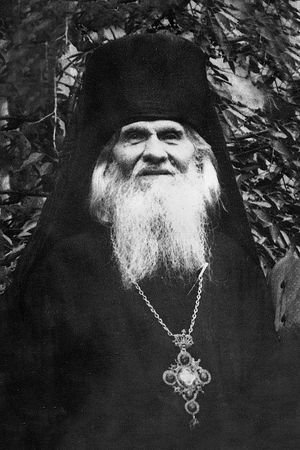 St. Lawrence of Chernigov Look at Saint Lawrence of Chernigov, a great elder of recent times, whose name is well known in other Orthodox countries such as Romania, for example, who prophesied about the events in Ukraine. If you haven’t read the prophecy, it is available here.
St. Lawrence of Chernigov Look at Saint Lawrence of Chernigov, a great elder of recent times, whose name is well known in other Orthodox countries such as Romania, for example, who prophesied about the events in Ukraine. If you haven’t read the prophecy, it is available here.
Saint Lawrence accurately prophesied how after a little freedom, meaning the end of godless communism, a new persecution would emerge in Ukraine. He warned about these schismatics, calling them self-consecrators.
It’s a strawman argument at best, to focus on the technicalities of the extremely questionable, if not cut-and dry ordinations of people like Mstyslav, than to look instead at their spiritual fruits, what came out of their “prayers”, and what are their children doing today. Where are their uncorrupt and myrrh streaming saints and icons?
It is obvious where saints like those mentioned before, and St. John of Shanghai, for example would stand on this issue. Saint John was born near Svyatogorsk Lavra in modern day Ukraine and was educated in Poltava.
Are you familiar with the Orthodox people of Poltava? I once had the blessing of serving with His Eminence, Metropolitan Phillip of Poltava, a pious man who evidently cares very strongly for the people of his native Ukraine. This is the wish I have for our foreign brothers and sisters, who don’t have friends, family, or loved ones in Ukraine. Visit Ukraine before you make up your mind! Visit the holy sites that the schismatics want to seize; talk with believers there, read the history of the local saints.
I was extremely blessed to have met His Beatitude, Metropolitan Onufry of Kiev and All Ukraine multiple times and can say he is a spiritual athlete of piety and a man who shines forth holiness. Have you met any canonical Ukrainian hierarchs or clergy, or on the other hand; have you met Philaret and Epiphany? Can the same be said about them?
Metropolitan Luke of Zaporozhye served at the ordination to the episcopate of Bishop Luke of Jordanville, a decedent of Carpatho-Russians. Among the Rusyn saints is Alexis the Carpatho-Russian, who lived at a time when Transcarpathia was part of the Patriarchate of Belgrade, due to the Bolshevik occupation of Holy Russia. No one in Moscow disrespects him because of that; he desperately did not want Transcarpathia to be brought into Soviet Ukraine or the Soviet Union in general.
Those saints are the spiritual fathers of all the Church of Rus’, which is spread across multiple countries both in the homelands and in the diaspora. This Church has been constantly decorated and filled with the glorious works of wonderful Church actors of Ukrainian decent, take for example the fact that Metropolitan Hilarion, the First Hierarch of the Church Abroad is himself a Ukrainian. The Moscow Patriarchate has no issue whatsoever with Ukrainians. How could she when almost half her members are Ukrainian? In the mid-80s, people from Ukraine accounted for over fifty percent of the students of the theological schools of the Russian Orthodox Church!
If you define a Ukrainophile as someone who cares about Ukraine, you could argue that the Moscow Patriarchate is the most Ukrainophilic organization in the world. Unlike the UAOC to which Mstyslav belonged, which was dissolved by Constantinople, the UOC is fully canonical.
The UOC is in fact already almost autocephalous in every practical way, save for the fact they commemorate the Patriarch of Moscow and receive their Chrism from him. The “autocephaly” Constantinople gave the OCU, the successor to the UAOC is less than the previous uncanonical organization held, and even less than the UOC itself. In fact, UOC bishops have every right to vote and participate in the Bishops' Council of the ROC, even on matters concerning the Church in Russia, and the Metropolitan of Kiev is the second highest ranking member of the Synod of the ROC—while the OCU has no such rights.
So again, what is autocephaly and what is slavery? Rather than worrying about these technical terms, look to their fruits! It is so plainly obvious!
The fruits of schismatics such as Mstyslav is a grey, shady period of confusion and schism, whereas the world will never forget such great saints as John of Shanghai, Lawrence of Chenrgiov, and Alexei the Carpatho-Russian, among the countless martyred clergy of the Church of Rus’ in Ukraine. If anyone has eyes, let them see that plainly before them.

